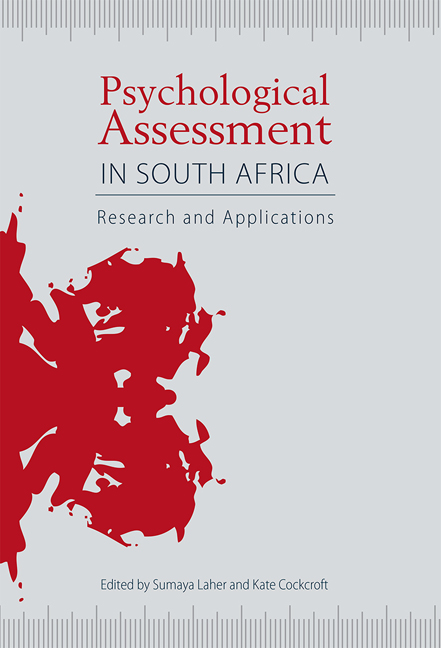Book contents
- Frontmatter
- Contents
- Tables and figures
- Acknowledgements
- Acronyms and abbreviations
- 1 Contextualising psychological assessment in South Africa
- Section One Cognitive tests: conceptual and practical applications
- Section Two Personality and projective tests: conceptual and practical applications
- 14 The Sixteen Personality Factor Questionnaire in South Africa
- 15 Using the Fifteen Factor Questionnaire Plus in South Africa
- 16 The Basic Traits Inventory
- 17 The Myers-Briggs Type Indicator® in South Africa
- 18 The NEO-PI-R in South Africa
- 19 Using the Occupational Personality Profile in South Africa
- 20 The Occupational Personality Questionnaire
- 21 The Millon Inventories in South Africa
- 22 Assessment and monitoring of symptoms in the treatment of psychological problems
- 23 Assessment in routine clinical and counselling settings
- 24 Projective assessment of adults and children in South Africa
- 25 The use of the Children's Apperception Test and Thematic Apperception Test in South Africa
- 26 Projective assessment using the Draw-A-Person Test and Kinetic Family Drawing in South Africa
- 27 The Rorschach in South Africa
- Section Three Assessment approaches and methodologies
- Contributors
- Index
15 - Using the Fifteen Factor Questionnaire Plus in South Africa
from Section Two - Personality and projective tests: conceptual and practical applications
Published online by Cambridge University Press: 21 April 2018
- Frontmatter
- Contents
- Tables and figures
- Acknowledgements
- Acronyms and abbreviations
- 1 Contextualising psychological assessment in South Africa
- Section One Cognitive tests: conceptual and practical applications
- Section Two Personality and projective tests: conceptual and practical applications
- 14 The Sixteen Personality Factor Questionnaire in South Africa
- 15 Using the Fifteen Factor Questionnaire Plus in South Africa
- 16 The Basic Traits Inventory
- 17 The Myers-Briggs Type Indicator® in South Africa
- 18 The NEO-PI-R in South Africa
- 19 Using the Occupational Personality Profile in South Africa
- 20 The Occupational Personality Questionnaire
- 21 The Millon Inventories in South Africa
- 22 Assessment and monitoring of symptoms in the treatment of psychological problems
- 23 Assessment in routine clinical and counselling settings
- 24 Projective assessment of adults and children in South Africa
- 25 The use of the Children's Apperception Test and Thematic Apperception Test in South Africa
- 26 Projective assessment using the Draw-A-Person Test and Kinetic Family Drawing in South Africa
- 27 The Rorschach in South Africa
- Section Three Assessment approaches and methodologies
- Contributors
- Index
Summary
When the Fifteen Factor Questionnaire Plus (15FQ+) was launched in South Africa in 2000, personality measurement was at a critical point in this country. Abrahams and Mauer (1999a; 1999b) had raised questions about the culture-fairness of the 16PF form SA92, which was the most widely used measure of Cattell's model at the time in South Africa. The original Fifteen Factor Questionnaire (15FQ), which the 15FQ+ was intended to replace, was not yet well known in South Africa. Results based on the standardisation sample indicated that the 15FQ+ was more reliable than other questionnaires measuring Cattell's factors, including the original 15FQ (Paltiel, 2000). Many psychologists had already been trained in the interpretation of Cattell's model, and this facilitated the adoption of the 15FQ+. The new questionnaire was implemented by several South African organisations and consulting psychologists, who collaborated on the collection of local standardisation data (Tredoux, 2002– 2011). Whereas initially there was a tendency to use the questionnaire on groups for which it was not suitable, there is now enough information to support responsible decision-making regarding the use of the 15FQ+ in South Africa.
Development of the 15FQ+
The original 15FQ questionnaire, which preceded the 15FQ+, was developed for industrial and organisational use (Budd, 1992). It included all Cattell's scales except for Factor B (Intelligence). The scales were constructed using a rigorous item analysis methodology (Barrett & Paltiel, 1993; 1996), designed to yield a short and reliable questionnaire with items correlating substantially higher with the scale for which they are coded, rather than with any other scale in the questionnaire. This approach helped to ensure that the scales were unidimensional. The 15FQ was offered as an alternative to the 16PF, which some authors considered too unreliable for occupational use at the time (Barrett & Kline, 1982; Saville & Blinkhorn, 1981). The 15FQ was developed for use in the UK, but soon gained acceptance in Australia and New Zealand. Pilot studies conducted in South Africa indicated that the 15FQ was less reliable in this country than the Occupational Personality Profile (OPPro); hence the use of the OPPro, rather than the 15FQ, was encouraged here.
- Type
- Chapter
- Information
- Psychological Assessment in South AfricaResearch and Applications, pp. 218 - 231Publisher: Wits University PressPrint publication year: 2013

